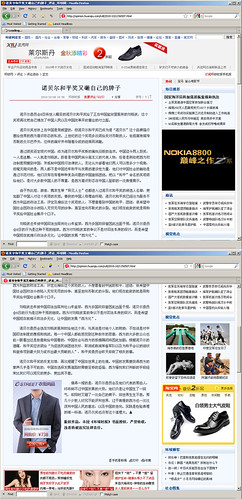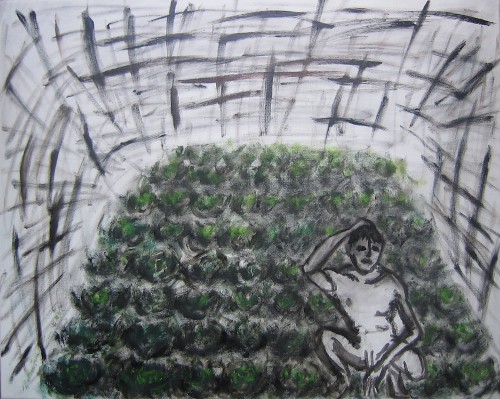The news that 2010 Nobel Peace Prize awarded to Chinese Liu Xiaobo was not widely reported in China. I was only able to find two reports on online portal from mainland China, one was on
环球时报 (The Global Times) and the other
财经时报 (Business Times). The former, according to Wikipedia, is a overseas version of China Daily, the official newspaper of the Chinese Communist Party and the latter is a newspaper or magazine which had been championing different policies and repeated earned the displeasure of the government. It was remarkable that it was able to report the news.
The Chinese texts follows, then the Chinese translations:
2010年諾貝爾和平獎頒發給中國公民劉曉波的消息在中國沒有被廣泛報導。我只能找到兩個中國內地的網站報告,,一個是在環球時報,另一个是財經時報。前者,根據維基百科,是海外版本的中國日報,中国共产黨的官方報紙,後者是一份報紙或雜誌,一直倡導不同的政策,并反复贏得了政府的不滿。它能夠報告了這一消息已是很了不起。
中文文本如下,那麼,中國的翻譯:
诺贝尔和平奖又砸自己的牌子 2010-10-09 15:56
诺贝尔委员会8日将世人瞩目的诺贝尔和平奖给了正在中国监狱里服刑的刘晓波,这个奖项再次把自己摆在了中国人民以及中国改革开放事业的对立面。
诺贝尔奖总体上在中国是有威望的,但诺贝尔和平奖已成为借“诺贝尔”这个品牌强行塞给世界的西方意识形态的私货。上世纪的这个奖项多次颁给反对苏联的人,包括直接搞垮苏联的戈尔巴乔夫,这样的偏好并未随着冷战的结束而消融。
通过颁奖否定现代中国,成为诺贝尔和平奖新的偏执狂般的追求。中国迄今两人获奖,一人是达赖,一人就是刘晓波。前者是中国民族分离主义的代表人物,后者是鼓动把西方政治制度照搬到中国,并抵制中国现行法律的人。无论从外部看他们两人可以有多少个视角,但毫无疑问的是,两人都不是中国近年和平与发展的建设性力量,他们对中国社会的触动是通过示范对抗,他们没有在有着种种复杂问题的中国宣扬团结。把以“和平”命名的奖项颁给他们,是对大多数中国人的不尊重,是西方意识形态在中国人面前的一次傲慢展示。
由于热比娅、胡佳、魏京生等“异见人士”也都进入过诺贝尔和平奖的候选人名单,更加剧了中国人对这个奖项的反感。善良的中国人有理由怀疑,诺贝尔和平奖已经沦为服务于西方利益的政治工具,评定及操纵这个奖项的人,不愿意看到中国的和平、团结,很希望中国社会因政治分歧陷入无穷无尽的纷争,直至走向苏联式的分裂。他们现在能做的就是用和平奖给中国社会撕开个口子。
刘晓波去年被中国司法当局判处11年监禁,西方多国政府曾因此出面干预,诺贝尔委员会8日的行为是这种干预的继续。西方对刘晓波案的争议不是对司法本身的探讨,而是希望中国现在就推行政治多元化,让中国的发展“西方化”。
诺贝尔委员会选在刘晓波服刑时给他这个奖,与其说是对他个人的鼓励,不如说是对中国司法制度的蔑视和挑战。每一个中国人都能感觉到这种故作的恶意,西方的大多数公众也能一眼看出这是故意做给中国看的,中国社会与西方的感情隔阂将因此加剧。根据诺贝尔的遗嘱,和平奖应该颁给“为促进民族团结友好、取消或裁减常备军队以及为和平会议的组织和宣传尽到最大努力或作出最大贡献的人”,和平奖委员会昨天却做了相反的事。
诺贝尔和平奖的反复非难,再次提醒了中国在世界上的处境。中国的发展要获得西方的掌声几乎是不可能的,中国在选择发展道路时需要足够的坚强,西方骚扰我们判断的手段经常比我们可以预见的更多,更出其不意。
值得一提的是,诺贝尔委员会及他们代表的那些人,终将拗不过中国发展的大势。他们只是让中国生了一回气,却同时又砸了一次自己的牌子,但世界生生不息。那几个少数人终究不能评判世界,过于傲慢的西方也一次次误判中国人民的意志,以及中国的走向。实践是检验真理的唯一标准,诺贝尔奖也没有这个道理大。
Nobel Peace Prize Damaged Their Own Brand Again [Links to original Chinese texts] 2010-10-09 15:56
On September 8th, the Nobel Committee awarded the Nobel Peace Prize to Lui Xiaobo, who is serving a sentence in China, thus once again, put itself in the opposition to the Chinese people and the China's undertaking of reform and opening up.
Nobel Prize in general is prestigious in China, but the Nobel Peace Prize has become Western ideological stuff forced upon the world in the brand of "Nobel". In last century, this award were given to the people who opposed the Soviet Union many times, including the culprit who was responsible for the collapse of the Soviet Union, Mikhail Gorbachev; this preference does not melt with the end of the Cold War.
Through the award to negate modern China, has become the Nobel Peace Prize's new pursuit of paranoia. China has so far two winners, one is the Dalai Lama, the other is Liu Xiaobo. The former is a representative figure of ethnic separatism, while the latter agitate to duplicate the Western political system in China and rejected China's existing laws. Vied from the outside on however many perspectives, there is no doubt that they are the constructive forces for recent peace and development of China, and they touched on Chinese society through their demonstration of confrontation, and they did not promote unity in China, which is facing a variety of complex issues. To award the "peace" prize to them, is disrespectful to the majority of Chinese people and it was another arrogance display of Western ideology in front of Chinese people.
The fact that Kadeer, Hu Jia, Wei Jingsheng and other "dissidents" have also entered into the list of candidates for the Nobel Peace Prize, has aggravated the Chinese people's resentment towards this award. Friendly and trusting Chinese people have reasons to suspect that Nobel Peace Prize has been reduced to a political tool to serve the Western interests, and the people who evaluate and manipulate this award do not want to see peace and unity in China, and very much hope that the Chinese community falls into infinity endless strife because of political differences, until toward Soviet-style split. What they can do now is to use the Peace Prize to tear a hole in Chinese society.
Liu Xiaobo was last year sentenced by China's judicial authorities to 11 years in prison, and many Western governments had tried to intervene. The behavior of Nobel Committee on the 8th is a continuation of this interference. The West's dispute of Liu's case is not of the judiciary itself, but to wish to implement political pluralism in China, so that China's development would of the characteristics of "Westernization."
The Nobel Committee's choosing to give Liu Xiaobo this award when he is serving sentence is not just a personal encouragement to him, rather, it is contempt and challenge of Chinese judicial system. Every Chinese person can feel the malice in this mockery, and most of the Western public could tell this was a show intended for China to see, and it will increase the alienation of Chinese and Western society. According to Nobel's will, the peace prize should be awarded "to the person who shall have done the most or the best work for fraternity between nations, the abolition or reduction of standing armies and for the holding and promotion of peace congresses", Peace Prize Committee has done the opposite yesterday.
Nobel Peace Prize's repeated criticism, once again reminded China its situation in the world. It is impossible for China's development to get applause in the West, and China should be tough enough in choosing its road to the development, and the means the West employed to harass our judge are often more than we can foresee and more surprising.
It is worth mentioning that the Nobel Committee and those people they represent, will eventually fail to prevent the trend of China's development. They only anger Chinese once, while damaged their own brand, but the world grows continually. After all, those few people can not judge the world, and the too arrogant West has repeatedly misjudged the will of the Chinese people and China's direction. Practice is the sole criterion for testing truth, even the Nobel Prize is no bigger than this truth.

2010-10-09 15:56
环球时报
The
Global Times (
simplified Chinese:
环球时报;
traditional Chinese:
環球時報;
pinyin:
Huánqiú Shíbào) is a daily
Chinese newspaper produced under the auspices of the official
Chinese Communist Party newspaper, the
People's Daily,
focusing on international issues. -
Wikipedia
*******************************************************************
刘晓波获得2010年诺贝尔和平奖 [Links to the original Chinese texts] 2010/10/08 @ 10:29pm 北京时间
挪威当地时间周五(2010年10月8日)下午5点,诺贝尔奖委员会将2010年的和平奖颁发给正在中国监狱服刑的民主活动人士刘晓波,中国政府随后立即对此决定进行抨击。
诺贝尔奖委员会在公开声明中表示,此奖是为表彰刘晓波为中国基本人权进行的长期和非暴力奋斗。该委员会一直认为,人权与和平有着密不可分的关系,正如阿尔弗雷德诺贝尔在遗嘱中所写的那样,人权是各国各民族之间友好共处的前提条件。
诺贝尔奖委员会指出,在过去的二十年,刘晓波一直为捍卫中国公民这些基本权利而大声疾呼。他参加了1989年的天安门抗议活动,并且参与了《零八宪章》的撰写和起草。2009年,刘晓波因为「颠覆国家安全」被判处11年徒刑,并剥夺政治权利两年。
诺贝尔奖委员会还表示,海内外许多中国人都参加到推动中国建立普世人权的运动中来。尽管刘晓波遭到了严厉惩罚,但是他已经成为许多中国人为基本人权而冲锋在前的奋斗象征。
刘晓波55岁,吉林长春人。1982年吉林大学毕业,进入北京师范大学攻读硕士和博士。1989年春夏之间在国外讲学,1989年天安门运动高潮回到中国,参加绝食。运动被镇压后被捕开除公职。1996年再度因言获罪,劳教3年。2008年主持起草《零八宪章》,12月被捕,2009年圣诞节,在北京以「煽动颠覆国家政权罪」判刑11年,目前在锦州监狱服刑。
中国外交部随后迅速抨击了诺贝尔奖委员会的决定。外交部发言人马朝旭在就刘晓波获奖回答记者提问时说:「诺贝尔和平奖应授予‘为促进民族和睦,增进各国友谊,推动裁军以及为召开和宣传和平会议而努力的人’,这是诺贝尔的遗愿。刘晓波是因触犯中国法律而被中国司法机关判处徒刑的罪犯,其所作所为与诺贝尔和平奖的宗旨背道而驰。诺委会把和平奖授予这样一个人,完全违背了该奖项的宗旨,也是对和平奖的亵渎。」
马朝旭在回答刘晓波获奖是否会影响中挪关系的提问时说,近年来,中挪关系一直保持良好发展,这有利于两国和两国人民的根本利益。诺委会授奖刘晓波与诺贝尔和平奖宗旨背道而驰,也会给中挪关系带来损害。
Liu received the 2010 Nobel Peace Prize [Link to original Chinese texts] 2010/10/08 @ 10:29 pm GMT
Norway on Friday (October 8, 2010) 17:00, Nobel Prize Committee awarded the 2010 Peace Prize to Chinese prisons are serving sentences of democracy activists Liu Xiaobo, the Chinese government immediately criticized this decision.
Nobel Committee said in a public statement, this award is in recognition of Liu Xiaobo's long-term and non-violent struggle to promote basic human rights in China. The Commission has always maintained that human rights and peace has a close relationship, just as Alfred Nobel wrote in his will that human rights are prerequisite for friendly coexistence amongst countries and peoples.
Nobel Committee noted that in the past twenty years, Liu has been speaking out to defend these basic rights for Chinese citizens. He participated in the Tiananmen Square protests of 1989, and participated in the the writing and drafting of "08 Charter". In 2009, Liu was sentenced to 11 years imprisonment and deprivation of political rights for two years because of "the subversion of national security".
Nobel Committee also said many Chinese people at home and abroad had participated in promoting the establishment of universal human rights in China. Although Liu was severely punished, he has become the symbol of many Chinese people's struggle for fundamental human rights.
55-year-old Liu Xiaobo was born in Changchun, Jilin Province. He graduated from Jilin University in 1982, and enrolled into the master's and Ph.D. Beijing Normal University. Between spring and summer of 1989 he gave lectures in foreign countries, and returned to China during the climax of 1989 Tiananmen Square movement to participate in hunger strike. After the movement was cracked down, he was arrested and was fire public posts. In 1996, he was convicted again for speeches, and was sentenced to reeducation through labor for 3 years. In 2008, he presided over the drafting of "Lingba ('08) Charter", and was arrested in December 2009 and on Christmas in Beijing he was sentence to 11 years for "inciting subversion of state power", and is currently serving prison terms in Jinzhou.
Chinese Foreign Ministry quickly criticized the Nobel Committee's decision. Foreign Ministry Spokesperson Ma Zhaoxu answered a reporter's question, said: "Nobel Peace Prize should be awarded 'to the person who shall have done the most or the best work for fraternity between nations, the abolition or reduction of standing armies and for the holding and promotion of peace congresses', which was Nobel's wishes. Liu Xiaobo is in a criminal who broke Chinese laws and was sentenced to prison by the Chinese judicial system, and his behaviors were in contrary to the purpose of the Nobel Peace Prize. Nobel Committee awarded the Peace Prize to such a person, was in completely contrary to the purposes of the prize, and it was also the desecration of the peace prize."
Answer the question that if Liu Xiaobo's award would affect the question of bilateral relations of China and Norway, Ma Zhaoxu answered that in recent years, Sino-Norwegian relations had maintained sound development, which was conducive to the two countries and two peoples interests. Nobel Committee's awarding Nobel Peace Prize to Liu Xiaobo ran counter to its purpose, and it would bring damage to the Sino-Norwegian relations.








